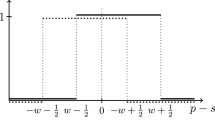Abstract
We reassess the possibility of full information pooling in a Condorcet jury environment featuring heterogeneous and privately known preference types. We find that in general, with uncorrelated preference types, only very limited heterogeneity is compatible with full pooling. We provide a sufficient condition, based on a simple measure of preference misalignment, under which the set of voting rules compatible with full pooling is at most a singleton. As a caveat to any simplistic conclusions, we identify a case in which an increase in heterogeneity (i.e. polarization) systematically generates the possibility of full pooling. Increased jury size, in contrast, is shown to always render full pooling more difficult.
Similar content being viewed by others
References
Austen-Smith D., Feddersen T.J. (2006) Deliberation, preference uncertainty and voting rules. American Political Science Review 100(2): 209–217
Coughlan P.J. (2000) In defense of unanimous jury verdicts: Mistrials, communication, and strategic voting. American Political Science Review 94(2): 375–393
Gerardi D., Yariv L. (2007) Deliberative voting. Journal of Economic Theory 134(1): 317–333
Meirowitz A. (2007) In defense of exclusionary deliberation: Communication and voting with private beliefs and values. Journal of Theoretical Politics 19(3): 301–328
Milgrom P., Roberts J. (1986) Relying on the information of interested parties. Rand Journal of Economics 17(1): 18–32
Schulte E. (2010) Information aggregation and preference heterogeneity in committees. Theory and Decision 69(1): 97–118
Van Weelden R. (2008) Deliberation rules and voting. Quarterly Journal of Political Science 3(1): 83–88
Visser B., Swank O.H. (2007) On committees of experts. Quarterly Journal of Economics 122(1): 337–372
Author information
Authors and Affiliations
Corresponding author
Rights and permissions
About this article
Cite this article
Thordal-Le Quement, M. Communication compatible voting rules. Theory Decis 74, 479–507 (2013). https://doi.org/10.1007/s11238-012-9329-0
Published:
Issue Date:
DOI: https://doi.org/10.1007/s11238-012-9329-0




